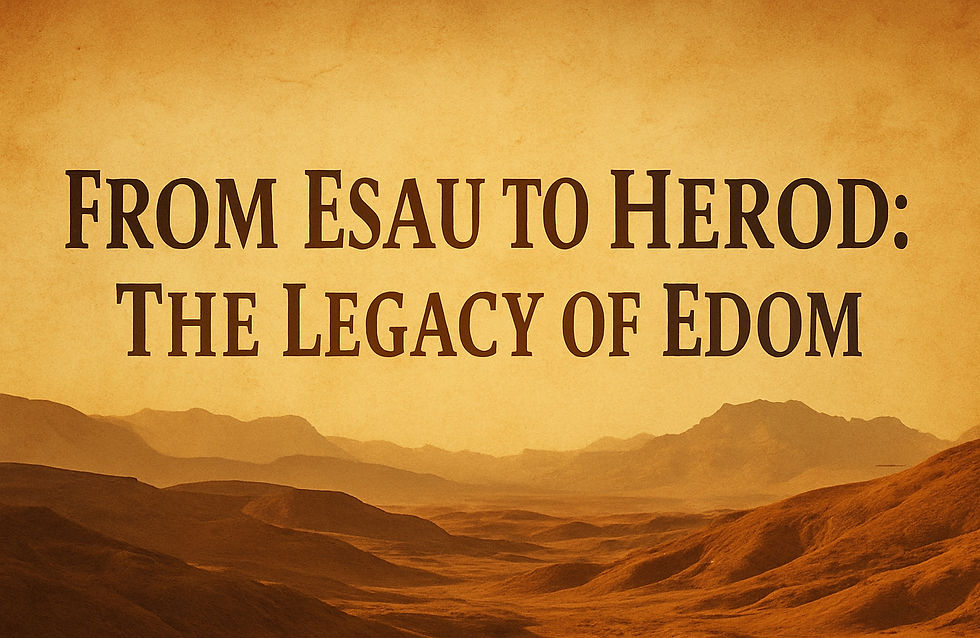Edom in Prophecy: The Fall of Esau’s Mountain
- Bible Believing Christian

- Sep 4, 2025
- 3 min read

Edom in Prophecy: The Fall of Esau’s Mountain
The story of Jacob and Esau does not end with their personal reconciliation. The rivalry between their descendants—Israel and Edom—echoes across centuries of biblical history. Again and again, Edom opposed Israel, and the prophets used Edom as a symbol of pride, betrayal, and hostility against God’s people. Ultimately, Edom’s downfall became a prophetic warning to every nation that exalts itself against the Lord.
Biblical Foundations: Edom’s Pride and Betrayal
Edom’s geography mirrored its pride. The nation was built into the red sandstone cliffs of Seir, fortified cities perched high like eagles’ nests. Yet God declared their downfall:
“The arrogance of your heart has deceived you, You who live in the clefts of the rock, In the loftiness of your dwelling place, Who say in your heart, ‘Who will bring me down to earth?’ Though you make your home high like the eagle, Though you set your nest among the stars, From there I will bring you down,” declares the Lord. (Obadiah 1:3–4, NASB)
Edom’s sins included refusing passage to Israel during the wilderness journey (Numbers 20:14–21) and later gloating over Jerusalem’s destruction:
“Do not gloat over your brother’s day, The day of his misfortune. And do not rejoice over the sons of Judah On the day of their destruction; Yes, do not boast On the day of their distress.” (Obadiah 1:12, NASB)
Thus, Esau’s descendants fulfilled the prophecy given before his birth: the older would serve the younger, not through service willingly rendered, but through judgment.
Prophetic Witness: The Fall of Edom
Several prophets addressed Edom’s arrogance and betrayal:
Isaiah 34:5–6 speaks of the Lord’s sword “drunk with blood” over Edom.
Ezekiel 35:3–5 announces perpetual desolation because Edom “harbored perpetual hostility” against Israel.
Jeremiah 49:16–18 declares that Edom will become like Sodom and Gomorrah—utterly destroyed.
Edom’s mountain strongholds symbolized security, but God promised their collapse. Pride, betrayal, and violence against His people would not go unpunished.
New Testament Insights: Edom as a Symbol
By the New Testament era, Edom as a nation had largely disappeared, absorbed into Idumea. Yet its legacy lingered. King Herod the Great—an Idumean—embodied the old hostility of Esau’s line. His attempt to kill the infant Christ (Matthew 2:16) was Edom’s opposition brought to its climax.
Theologically, Edom became a symbol of the world’s enmity against God’s people. Just as Edom rejoiced at Jerusalem’s fall, so too does the world delight in persecuting the church. Yet, as with Edom, their triumph is short-lived.
Theological and Historical Notes
Early Jewish writings often equated Edom with Rome, the great oppressor of Israel. The symbol stretched beyond geography into typology: Edom became shorthand for all arrogant powers against God.
Augustine interpreted Edom as the city of man in contrast to the city of God, destined for destruction.
Archaeology confirms the pride of Edom’s fortresses at Petra, but also their eventual collapse, validating the prophetic warnings.
Misconceptions
“Edom still exists as a nation today.”
– Historically, Edom disappeared as a distinct people by the first century. The Bible’s warnings against Edom apply symbolically, not literally to a modern nation.
“Edom’s destruction contradicts God’s promise to Esau.”
– Not so. God promised nations from both Jacob and Esau, but only Jacob’s line carried the covenant. Esau’s line persisted, but in rebellion, until judgment came.
“Edom’s downfall was just about politics.”
– The prophets present it as theological: pride and betrayal against God’s chosen people.
Why This Matters
Edom’s downfall warns us against pride, betrayal, and hostility toward God’s people. No fortress is high enough, no alliance strong enough, to protect a nation or individual who sets themselves against the Lord.
For believers today, Edom serves as both warning and comfort: warning that pride and opposition to God lead to ruin, and comfort that God defends His people. The Messiah triumphed where Edom fell, securing victory not through arrogance but through humility and the cross.
Conclusion
The fall of Edom is the fall of every proud kingdom that resists God. Esau’s mountain crumbled, Herod’s dynasty faded, Rome collapsed—but God’s kingdom endures forever. As Obadiah concludes: “The deliverers will ascend Mount Zion To judge the mountain of Esau, And the kingdom will be the Lord’s.” (Obadiah 1:21, NASB).


